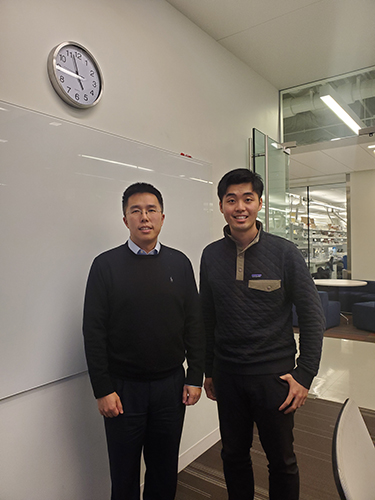
On February 14, 2020, Kyungjoo Noh successfully defended his thesis, “Quantum computation and communication in bosonic systems” (advisor: Liang Jiang).
Noh explained “Quantum computation and communication are two important branches of quantum information science where we can benefit from unique features of quantum mechanics. However, the utility of these quantum technologies is limited by unavoidable noise in realistic quantum devices. Therefore, quantum error correction (QEC) is essential to fully realize the potential of these quantum technologies. A conventional approach for implementing QEC is to use many noisy quantum bits (or qubits, each of which has two quantum states) and sacrifice most of them to construct fewer but more reliable logical qubits. However, the required resource overhead associated with the use of this conventional approach is too high for this approach to be deployed at scale with currently available quantum devices.
Noh will join Amazon Web Services as a Quantum Research Scientist
Thesis abstract: Quantum computation and communication are important branches of quantum information science. However, noise in realistic quantum devices fundamentally limits the utility of these quantum technologies. A conventional approach towards large-scale and fault-tolerant quantum information processing is to use multi-qubit quantum error correction (QEC), that is, to encode a logical quantum bit (or a logical qubit) redundantly over many physical qubits such that the redundancy can be used to detect errors. The required resource overhead associated with the use of conventional multi-qubit QEC schemes, however, is too high for these schemes to be realized at scale with currently available quantum devices. Recently, bosonic (or continuous-variable) quantum error correction has risen as a promising hardware-efficient alternative to multi-qubit QEC schemes.
In this thesis, I provide an overview of bosonic QEC and present my contributions to the field. Specifically, I present the benchmark and optimization results of various single-mode bosonic codes against practically relevant excitation loss errors. I also demonstrate that fault-tolerant bosonic QEC is possible by concatenating a single-mode bosonic code with a multi-qubit error-correcting code. Moreover, I discuss the fundamental aspects of bosonic QEC using the framework of quantum communication theory. In particular, I present improved bounds of important communication-theoretic quantities such as the quantum capacity of bosonic Gaussian channels. Furthermore, I provide explicit bosonic error correction schemes that nearly achieve the fundamental performance limit set by the quantum capacity. I conclude the thesis with discussions on the importance of non-Gaussian resources for continuous-variable quantum information processing.